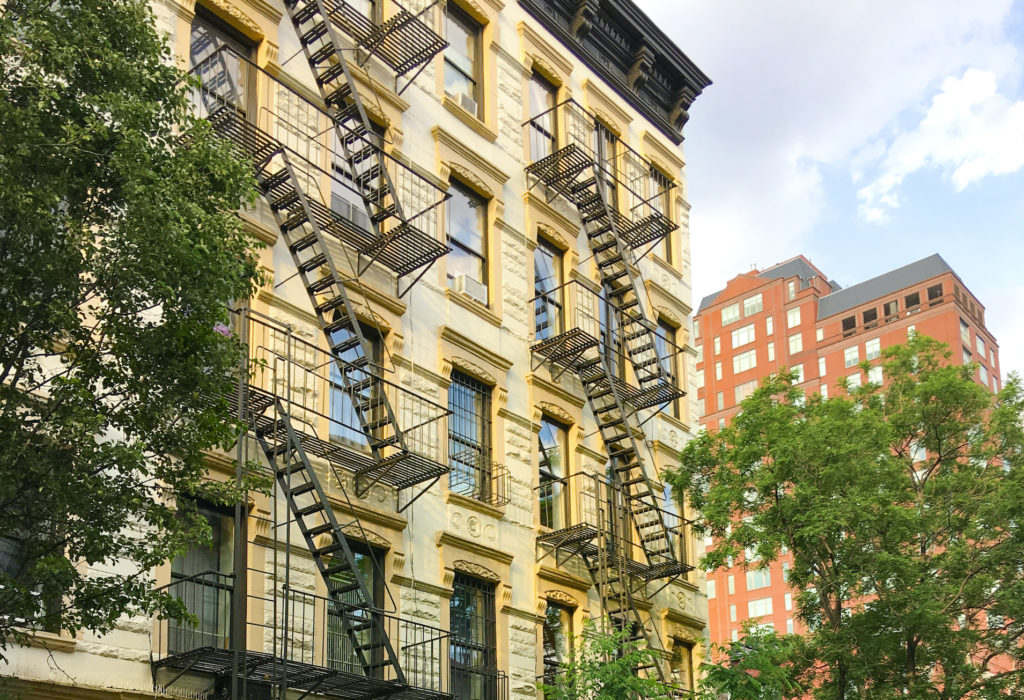
What is a walk-Up Apartment?
A walk-up apartment is in a building without an elevator. These buildings are usually between three and six stories tall, and residents use stairwells to access their units. Sometimes that’s just one flight up. In other cases, it could be five or more.
You’ll find walk-up apartments most often in older buildings in major cities—think: Brooklyn brownstones, Chicago three-flats, or San Francisco Victorians. But the term can apply to any rental without elevator access, even in newer construction.
Why Are Walk-Up Apartments So Common?
Most walk-up buildings were constructed before elevators were standard in residential buildings. In dense urban areas where land is expensive, smaller buildings with walk-up access allowed for more housing units without the cost or complexity of an elevator system.
Even in newer developments, some landlords choose to build walk-ups because it keeps construction and maintenance costs lower. That can translate to slightly lower rent prices, which makes them attractive to cost-conscious renters.
Pros of renting a walk-up apartment
Walk-up apartments can come with several advantages, especially if you’re living in a city and don’t mind the stairs:
1. More Affordable Rent
One of the biggest benefits of a walk-up apartment is that it can be cheaper than a similar unit in a building with an elevator. Without the convenience of an elevator, or the cost of maintenance, and repairs, landlords can keep rents lower.
2. Prime Locations
Because they’re often in bustling, historic cities, you’ll find walk-ups in vibrant, walkable neighborhoods with easy access to public transportation, shops, and restaurants. If you want to live in the heart of the action—without paying top dollar for a high-rise—walk-ups can offer great value for the location.
3. Unique Charm and Character
Older walk-up buildings often have architectural details that newer buildings don’t, like unique crown molding, hardwood floors, exposed brick, and large windows. If you like the charm of a vintage apartment over a sterile white-box layout, a walk-up might feel more like home.
4. Built-In Exercise
It may sound small, but walking up stairs every day adds a bit of low-impact exercise to your routine. If you live on a higher floor, you’ll get a mini workout without needing to go to the gym.
Accessibility Considerations for Walk-Up Apartments
A major drawback of walk-up apartments is the lack of accessibility for people with mobility limitations. If you use a wheelchair, a cane, crutches, or even just have chronic joint or back pain, climbing stairs can be exhausting or impossible. Walk-ups may also be difficult (or unsuitable) for:
- Seniors or aging adults
- Pregnant renters or new parents
- Renters with temporary injuries or surgeries
- Guests or family members with disabilities
Additionally, walk-ups make moving more physically demanding for things such ase food deliveries, stroller use, or carrying heavy groceries.
If accessibility is critical for you—or may become important during your lease—an elevator building or ground-floor unit will likely be a better fit.
What to Ask Before Renting a Walk-Up Apartment
If you’re seriously considering a walk-up, it’s essential to ask the right questions before committing to it as your next home, like:
- What floor is the apartment on?
- Is there laundry in-unit or on-site?
- How old is the building, and when was it last updated?
- How is maintenance handled?
- Are there any accessibility concerns for visitors or deliveries?
- Are move-in fees higher because of stair access?
These answers can help you determine if a walk-up will work for your lifestyle or end up being more hassle than it’s worth.
Real-Life Scenarios: Who Walk-Ups Work Best For
👍 Great fit:
- Young professionals who want to live close to the action and don’t mind climbing a few flights.
- Budget-conscious renters who are willing to trade convenience for lower rent.
- Single renters or couples without kids or heavy furniture.
- Pet-free renters or those with small pets that don’t require frequent walks.
👎 Might not be a fit:
- Renters with disabilities or chronic pain
- People who frequently order furniture or groceries
- Anyone planning to move again soon (moving in and out is extra work!)
Walk-Up vs Elevator Apartments: Comparison Table
| Feature | Walk-Up Apartment | Elevator Apartment |
|---|---|---|
| Elevator Access | ❌ No | ✅ Yes |
| Average Rent Cost | 💰 Usually lower | 💸 Usually higher |
| Location | 🏙️ Often central and walkable | 🏙️ Also central, sometimes newer areas |
| Amenities | 🔻 Limited or none | ✅ Gym, doorman, package room, etc. |
| Accessibility | ⚠️ Not ideal for mobility issues | ✅ Better for all physical needs |
| Building Age | 🏚️ Often older/vintage | 🆕 Often newer or modern |
| Daily Exercise | ✅ Built-in stair workouts | ❌ Elevator convenience |
| Noise/Insulation | 🔊 May be less soundproof | 🛏️ Often better construction |
Tips for Moving Into a Walk-Up Apartment
- Hire movers—especially if you’re going above the second floor.
- Measure everything before moving day, including stairwells.
- Disassemble furniture when possible.
- Pack in small, manageable boxes to avoid injury.
- Label boxes clearly so you can avoid trips back and forth.
Planning ahead can save you time and stress—and help you avoid hauling a couch up four flights only to realize it won’t fit through the door.
Final Thoughts
Walk-up apartments offer a mix of charm, affordability, and urban convenience that appeals to many renters—especially in big cities. If you’re okay with stairs, a walk-up might be a great way to save money while still living in a central location. But they’re not for everyone. If accessibility, convenience, or amenities are high on your list, an elevator building may be a better match.
Before making a decision, weigh the pros and cons, visit the unit in person, and imagine what day-to-day life would truly be like. The right apartment isn’t just about price or location—it’s about how it fits your real life.
FAQs About Walk-Up Apartments
What is a walk-up apartment?
A walk-up apartment is in a building without an elevator. Renters use stairs to access their units.
Are walk-up apartments cheaper than elevator apartments?
They can be because they lack the added convenience and costs of elevator maintenance.
Do all walk-ups lack amenities?
It varies by building. Many do, especially older ones that haven’t gone through renovations. Some walk-ups may offer on-site laundry or bike storage, but few provide high-end amenities such as gyms or package lockers. Sometimes, you can find recently renovated walk-ups that offer more bells and whistles, often at an increased price tag as well.
Are walk-up apartments bad for families?
No, not necessarily. If you have a stroller, young kids, or need to carry lots of items regularly, the stairs can become a challenge, but it depends on your family’s needs.
What floor is best in a walk-up?
Lower floors offer more convenience, especially for renters who prefer not to climb multiple flights of stairs daily. But upper floors can be quieter and get more natural light.
Are walk-ups ADA-compliant?
Most walk-up buildings aren’t ADA-compliant simply because they lack elevators, which can make them difficult or impossible for renters with disabilities or limited mobility to access. That said, this doesn’t necessarily mean the building is breaking any laws. However, the Fair Housing Act prohibits housing discrimination based on disability. It often requires that ground-floor units and shared areas—such as lobbies, mailrooms, or laundry spaces—to be accessible or adaptable for people with mobility challenges.
How can I tell if a walk-up is right for me?
Consider your daily habits: Do you have pets? Do you order delivery often? Are you comfortable climbing stairs several times a day? Visit the unit and walk up the stairs to get a feel for it before committing.
Walk-up apartments give renters a chance to live in the city with affordable housing. Ready to find your own walk-up apartment? Search thousands of walk-up apartments for rent on Zumper.



